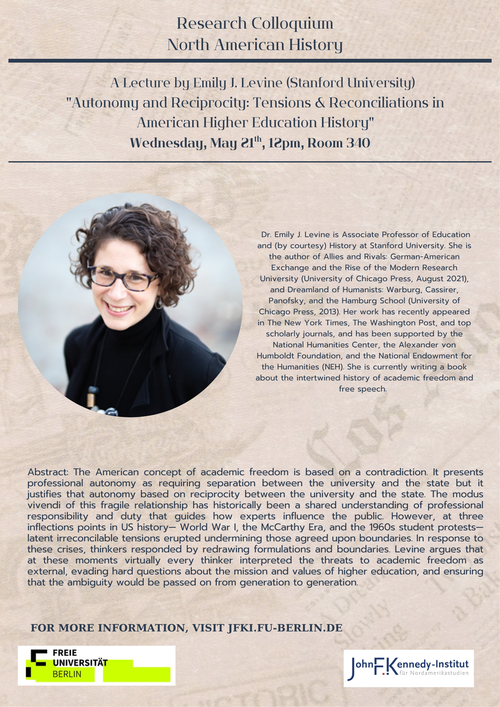Research Colloquium: Lecture by Emily J. Levine: "Autonomy and Reciprocity: Tensions & Reconciliations in American Higher Education History"
Dr. Emily J. Levine is Associate Professor of Education and (by courtesy) History at Stanford University. She is the author of Allies and Rivals: German-American Exchange and the Rise of the Modern Research University (University of Chicago Press, August 2021), and Dreamland of Humanists: Warburg, Cassirer, Panofsky, and the Hamburg School (University of Chicago Press, 2013). Her work has recently appeared in The New York Times, The Washington Post, and top scholarly journals, and has been supported by the National Humanities Center, the Alexander von Humboldt Foundation, and the National Endowment for the Humanities (NEH). She is currently writing a book about the intertwined history of academic freedom and free speech.
Abstract: The American concept of academic freedom is based on a contradiction. It presents professional autonomy as requiring separation between the university and the state but it justifies that autonomy based on reciprocity between the university and the state. The modus vivendi of this fragile relationship has historically been a shared understanding of professional responsibility and duty that guides how experts influence the public. However, at three inflections points in US history— World War I, the McCarthy Era, and the 1960s student protests— latent irreconcilable tensions erupted undermining those agreed upon boundaries. In response to these crises, thinkers responded by redrawing formulations and boundaries. This paper argues that at these moments virtually every thinker interpreted the threats to academic freedom as external, evading hard questions about the mission and values of higher education, and ensuring that the ambiguity would be passed on from generation to generation.

